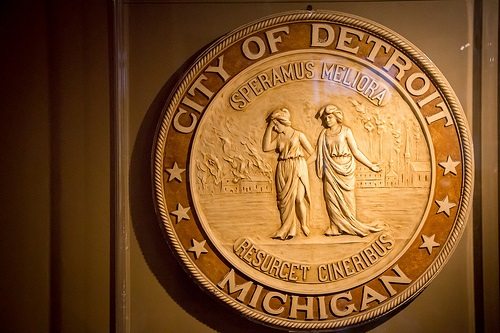
May 20, 2014; Business Insider
Here is an odd conundrum. A settlement deal negotiated between the federal government and JPMorgan Chase may look like a big number for government and for homeowners, but a number of experts suggest that JPMorgan may be getting off lightly. JPMorgan, for its part, says that the deal includes more than $100 million for Detroit. Should the appropriateness of stricter punishment for home mortgage scofflaw JPMorgan outweigh the need of bankrupt Detroit for $100 million, even if the source of the money might have harmed many Detroit homeowners over the years of its illegal activity?
As many, including NPQ, have reported, the federal government’s punishments of Wall Street banks for their various depredations during and after their instigation of the meltdown of mortgage markets haven’t been all that punitive. Better Markets, a nonprofit nonpartisan Wall Street watchdog, was underwhelmed by the Justice Department’s $13 billion more-sweetheart-than-punishment settlement with JPMorgan.
For having knowingly sold toxic subprime mortgage-backed securities, which JP Morgan admitted, the government hit Jamie Dimon’s firm in November of 2013 with what was supposedly the largest settlement ever agreed to by a U.S. corporation. Better Markets contended that the $13 billion was a cheap way out, approved by Attorney General Eric Holder, for JP Morgan to purchase “blanket civil immunity for years of alleged pervasive, egregious and knowing fraudulent and illegal conduct that contributed to the 2008 financial crash and the worst economy since the Great Depression.”
If it were truly a bad deal, JPMorgan’s board would have been frog-marching Dimon out of the C-suite, but instead they rewarded him with a 75 percent raise. Maybe part of that raise was because Dimon and his lieutenants were able to make personal calls to Department of Justice senior staff and negotiate the deal largely in secret (including one-on-one negotiations between Holder and Dimon), without scrutiny from the courts or Congress. The settlement includes $4 billion in assistance for homeowners, $2 billion in a penalty payable to Justice, and the remainder for settling other state and federal claims.
Sign up for our free newsletters
Subscribe to NPQ's newsletters to have our top stories delivered directly to your inbox.
By signing up, you agree to our privacy policy and terms of use, and to receive messages from NPQ and our partners.
Better Markets filed suit to challenge the settlement, but yesterday the Justice Department told the federal judge hearing the case to reject the case because Better Markets lacked standing. In its defense, Justice said that the settlement was “presumptively” unreviewable. In one of the oddest justifications it might have used, DOJ argued the department’s power and authority “to settle claims of the United States is undiminished, and that includes ‘the power to make erroneous decisions as well as correct ones.’” In other words, Justice might have screwed up and let Dimon and his colleagues off the hook for all time, but screw-ups are within its power and cannot be challenged.
Justice’s public message is implicitly that reopening the settlement for review would delay or perhaps undermine the plan for $4 billion in assistance for homeowners. Although not explicitly part of the settlement, JPMorgan also announced a plan to devote $100 million in loans and grants over five years for Detroit for home mortgages, job training, and blight removal. Dimon told the Detroit Free Press that specific beneficiaries of the funds will include the nonprofit employment and training program Focus: Hope, plus the Eastern Market, the M-1 streetcar line, and various workforce development projects. Others likely to see some share of the funds, as outlined in a brochure released by JPMorgan Chase, include Midtown Detroit, Southwest Solutions, and Techtown. Described as the “centerpiece” of the program, $50 million will be targeted to two Community Development Financial Institutions (CDFIs)—Invest Detroit and Capital Impact Partners.
Of course, Michigan Governor Rick Snyder was ecstatic about the announcement and suggested that it might nudge state legislators in Lansing to come up with the $350 million the state is supposed to provide to the “Grand Bargain” that private foundations, the City, and the bankruptcy judge have negotiated to help aid public pensions and to stave off the possibility of selling artwork from the Detroit Institute of Arts. Detroit Mayor Mike Duggan welcomed the $100 million, certainly likely to take significant interest in $20 million of the offer in loans and grants to the city’s land bank to auction homes to potential owner-occupants. “They are filling holes in our redevelopment plans in one stroke,” he said.
Presumably, were JPMorgan Chase dragged back into negotiations with the Justice Department over the $13 billion settlement, Dimon and his board members might find themselves temporarily hard-pressed to make the $100 million commitment to Detroit come to fruition. If calculated as a corollary investment on top of the $13 billion settlement, the $100 million is a pittance, with half of it to come back to JPM’s coffers in loan repayments.
Since Dimon did much of his negotiations around the Detroit investment with Quicken Loans owner Dan Gilbert, who has made the revitalization of downtown Detroit a personal and business mission, the JPMorgan commitment looks like a step toward big corporations expanding the boundaries of their social consciousness to saving bankrupt cities. Given that Detroit has long lived under a decision-making dynamic controlled by and often for the benefit of corporations (particularly automobile manufacturers), the notion of a corporate-controlled revitalization might be worth taking a deep breath or two.
For regulators and watchdogs concerned about the propensity of the federal government—and, surprisingly, the Obama administration’s Eric Holder—to implicitly buy into the “too big to fail” argument around banks and let corporate criminals escape personal liability and criminal prosecution, it is a matter of whether the corporate entities that brought the U.S. economy to its knees should be permitted to buy back their good names (plus blanket immunity) in secret negotiations with pledges to help homeowners here, Detroit nonprofits there, and CEO Jamie Dimon always.—Rick Cohen











